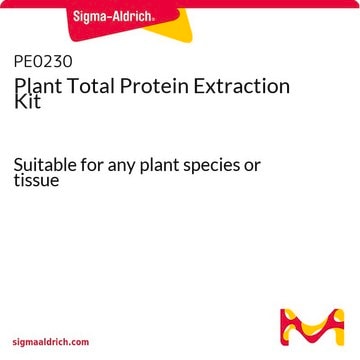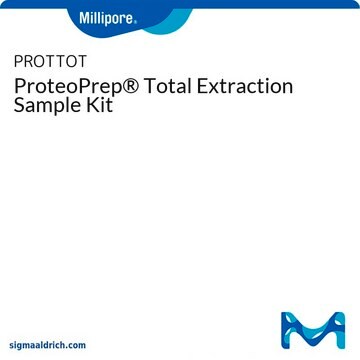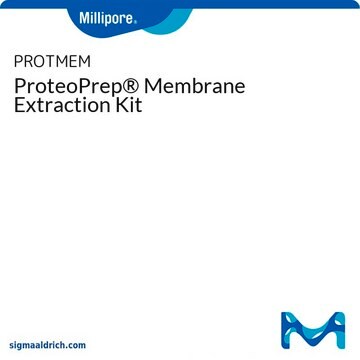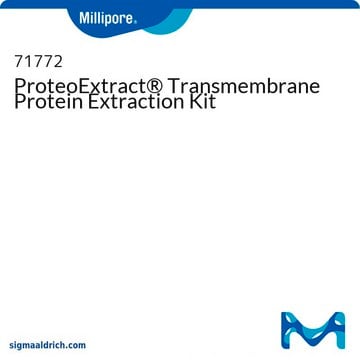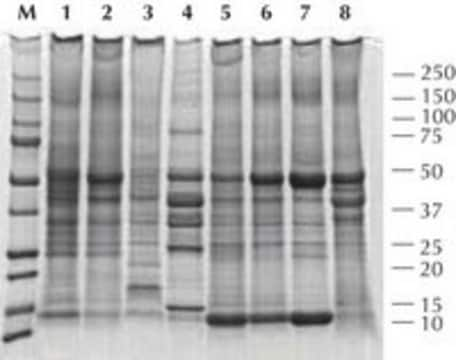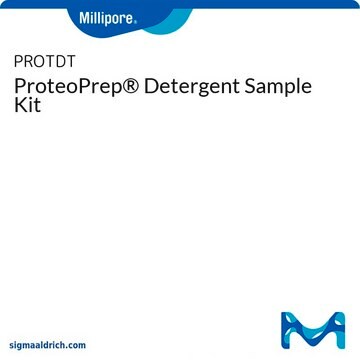C0356
Protein Extraction Reagent Type 4
Sinónimos:
Protein extraction solution
Iniciar sesiónpara Ver la Fijación de precios por contrato y de la organización
About This Item
UNSPSC Code:
41116012
NACRES:
NA.56
Productos recomendados
General description
Protein Extraction Reagent Type 4, is a highly premixed, prequalified and effective protein solubilization and extraction reagent composed of urea, thiourea, Trizma®, and detergent C7BzO (C0856).
Application
Protein extraction reagent type 4 is optimized for proteomic studies. Cellular and organelle membrane solubilizing reagent is ideal for protein extraction prior to isoelectric focusing and 2D electrophoresis. Reducing and alkylating reagents TBP (T7567) and iodoacetamide (A3221) are recommended for use with this reagent. Protein extraction reagent type 4 is also available as a component of the ProteoPrep® Sample.
Components
Contains urea, thiourea, Trizma®, and detergent C7BzO (C0856).
Legal Information
ProteoPrep is a registered trademark of Merck KGaA, Darmstadt, Germany
Trizma is a registered trademark of Merck KGaA, Darmstadt, Germany
signalword
Warning
hcodes
Hazard Classifications
Acute Tox. 4 Oral - Aquatic Chronic 2 - Carc. 2 - Repr. 2
Storage Class
11 - Combustible Solids
wgk_germany
WGK 3
flash_point_f
Not applicable
flash_point_c
Not applicable
ppe
dust mask type N95 (US), Eyeshields, Faceshields, Gloves
Elija entre una de las versiones más recientes:
Certificados de análisis (COA)
Lot/Batch Number
¿No ve la versión correcta?
Si necesita una versión concreta, puede buscar un certificado específico por el número de lote.
¿Ya tiene este producto?
Encuentre la documentación para los productos que ha comprado recientemente en la Biblioteca de documentos.
Los clientes también vieron
Roger A Moore et al.
Proteomics, 10(15), 2858-2869 (2010-06-03)
Transmissible spongiform encephalopathies (TSEs) or prion diseases are characterized by the accumulation of an aggregated isoform of the prion protein (PrP). This pathological isoform, termed PrP(Sc), appears to be the primary component of the TSE infectious agent or prion. However
Gabriel A Grilo et al.
Journal of molecular and cellular cardiology, 139, 62-74 (2020-01-25)
Age-related remodeling of the heart causes structural and functional changes in the left ventricle (LV) that are associated with a high index of morbidities and mortality worldwide. Some cardiac pathologies in the elderly population vary between genders revealing that cardiac
Meritxell Pérez-Hedo et al.
Proteome science, 10(1), 58-58 (2012-10-02)
Sesamia nonagrioides is a noctuid that feeds on maize, sugar cane and sorghum in North Africa and Southern Europe. Larvae reared under long day conditions pupate after 5 or 6 larval instars, whereas larvae reared under short day conditions enter
John McCarthy et al.
Journal of proteome research, 2(3), 239-242 (2003-06-20)
Carbamylation is widely quoted as being a problem in 2-D gel analysis and the associated sample preparation steps. This modification occurs when iso-cyanate, a urea break-down product, covalently modifies lysine residues, thus inducing a change in isoelectric point. Urea is
Chawalit Kocharunchitt et al.
Molecular & cellular proteomics : MCP, 11(1), M111-M111 (2011-10-20)
An integrated transcriptomic and proteomic analysis was undertaken to determine the physiological response of Escherichia coli O157:H7 Sakai to steady-state conditions relevant to low temperature and water activity conditions experienced during meat carcass chilling in cold air. The response of
Nuestro equipo de científicos tiene experiencia en todas las áreas de investigación: Ciencias de la vida, Ciencia de los materiales, Síntesis química, Cromatografía, Analítica y muchas otras.
Póngase en contacto con el Servicio técnico